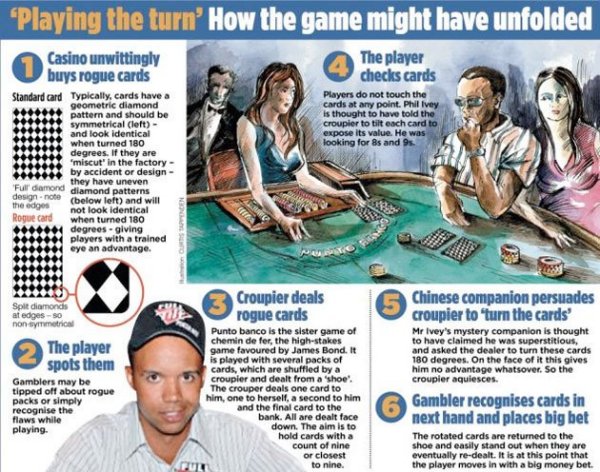Borgata Calls Phil Ivey Edge-Sorting "Premeditated, Practiced, and Intricate"

 After lying dormant for much of the last few months, the lawsuit filed by Borgata in Atlantic City against poker pro Phil Ivey (pictured) over $9.6 million that Ivey won at baccarat has heated up in recent weeks.
After lying dormant for much of the last few months, the lawsuit filed by Borgata in Atlantic City against poker pro Phil Ivey (pictured) over $9.6 million that Ivey won at baccarat has heated up in recent weeks.
—
PocketFives’ news coverage is brought to you by Betsafe, one of the leading suppliers of online gaming products worldwide and a major sponsor of Gumball 3000. Sign up now for great bonuses, €3,000,000 guaranteed monthly, and plenty of live events!
—
The original lawsuit filed by Borgata in April had been quiet as of late, but Ivey’s attorneys reopened the battle with a motion to dismiss the caseearlier this month. According to John Brennan’s Meadowlands Matters blog, the motion asked to dismiss the case on the grounds that Borgata did not file its complaint in the required time frame and that Borgata’s claims are inadmissible because a private company cannot make them in court.
The motion also stated that the New Jersey court system isn’t the place for solving such issues, noting that the New Jersey Casino Control Commission and Division of Gaming Enforcement normally handle disagreements.
 On Tuesday, Borgata fired back with its own motion to dismiss Ivey’s motion. In it, Borgata’s attorneys stated, “This case involves a premeditated, practiced, and intricate scheme by [Ivey] and Cheng Yin Sun to gain an advantage playing baccarat. Although their motion cleverly attempts to apply existing case law to the facts in this case, defendants cannot escape the fact that it is only casinos, and not casino patrons, that are regulated by New Jersey’s Casino Control Act.”
On Tuesday, Borgata fired back with its own motion to dismiss Ivey’s motion. In it, Borgata’s attorneys stated, “This case involves a premeditated, practiced, and intricate scheme by [Ivey] and Cheng Yin Sun to gain an advantage playing baccarat. Although their motion cleverly attempts to apply existing case law to the facts in this case, defendants cannot escape the fact that it is only casinos, and not casino patrons, that are regulated by New Jersey’s Casino Control Act.”
Borgata’s motion went on to state that the casino is completely within its rights to file a lawsuit against Ivey and Sun. In a previous case that involved players at the Golden Nugget in Atlantic City, a court found that a “private right of action” is allowed by the court system for a casino against a patron. “This was the only way for the Golden Nugget to recover its alleged damages.”
The case hinges on several visits by Ivey to Borgata in 2012, where he requested that the casino provide him with an outlet for baccarat. Playing at $50,000 per hand, Ivey put $1 million on the table, but had several requests that Borgata had to comply with in order to get his business.
Ivey requested a private area where he could play, a dealer who could speak Mandarin Chinese, the ability to bring a guest (allegedly Sun), one deck of purple cards from Gemaco, and an automatic shuffler. Borgata acquiesced to these requests and over the span of four sessions from April to October 2012, Ivey was able to book $9.6 million in profits.
The Borgata sessions were done at the same time that Ivey and Sun allegedly went to London for a similar game at Crockfords Casino. In several sessions in August 2012, Ivey is alleged to have won £7.3 million that Crockfords has, to this point, refused to pay out. That case is still awaiting adjudication.
Both casinos are alleging that, through the use of “edge-sorting,” Sun would direct the dealer to turn particular cards a certain way, stating that it was an Ivey “superstition,” so he could recognize said cards when they came out of the deck. The knowledge of the cards could swing the advantage from the casino to Ivey, both casinos profess, and Ivey hasn’t denied that he and Sun did this in either case:
Ivey and Sun have 12 counts against them in the Borgata lawsuit, including violations of RICO laws. A New Jersey magistrate judge, Ann Marie Donato, has scheduled a conference between the two sides for August 5 in which the discovery process will begin. That process could take up to eight months to play out, meaning that any potential trial wouldn’t begin until 2015. In the meantime, Donato has suggested that both sides attempt to mediate the situation and avoid a long and costly court battle.
Want the latest poker headlines and interviews? Follow PocketFives on Twitterand Like PocketFives on Facebook. You can also subscribe to our RSS feed.





